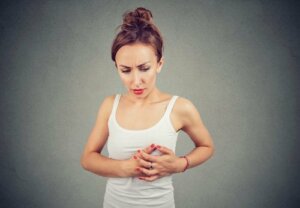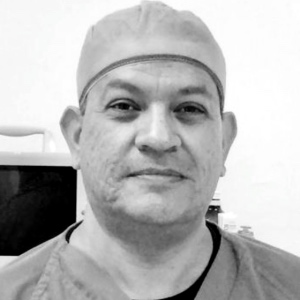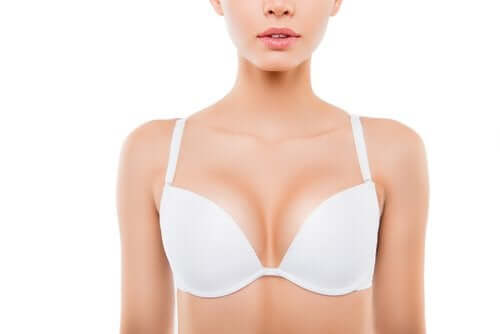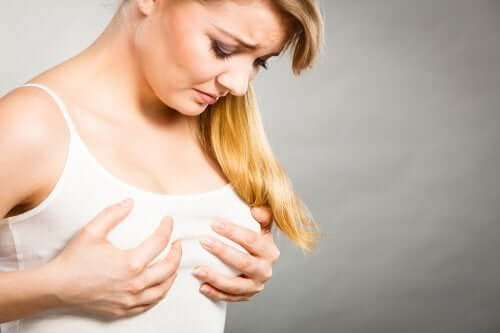Why Do Breasts Hurt During Ovulation


Reviewed and approved by the doctor Nelton Ramos
One of the questions that all women have asked themselves at some point in their lives is why do the breasts hurt during ovulation. While they understand that part of their feminine nature works through cyclical hormonal changes, they may not be specifically aware of their effects on the body.
To answer each question, in this article, we’ll present all the basic information about ovulation and its hormonal cycles. In addition, we’ll review to what degree its alterations are manifested in the body and, specifically, in a woman’s breasts.
Ovulation as a natural process, one of the keys to understanding why breasts hurt during ovulation
First, it’s important to briefly explain what ovulation is. It’s a natural process that develops as part of the female menstrual cycle; In it, an ovarian follicle breaks and releases an oocyte into the female reproductive system, so that it can then be fertilized by a sperm.
Within this menstrual cycle there are three stages:
- In the first, large amounts of estrogens are released.
- In the second phase, meanwhile, the amounts of progesterone rise.
- Finally, menstrual bleeding occurs – if there was no fertilization – or the pregnancy process.
So, it becomes clear that both estrogens and progesterone are the hormones responsible for the ovulation process. Both affect various parts of the body, such as the breasts and nipples, with their variations. Likewise, they also cause pain in the pelvis, vaginal discharge, mood swings or increased libido, and a 1 or 2-degree increase in temperature.

Of course, these symptoms aren’t noticeable in the same way by all women. Some manifest and suffer more than others; however, except in particular cases, the discomfort that occurs due to the alteration of the menstrual cycle doesn’t interrupt the daily development of the woman’s life.
As explained, the ovulation process and hormonal alterations work from a repetitive period or cycle. The same happens with female breasts, as they try to fulfill a function linked to reproduction.
For this reason, the pain that women feel and its subsequent disappearance is nothing more than their preparation to face a possible pregnancy.
Estrogens, like progesterone, are the hormones responsible for the ovulation process. Both affect various parts of the body, such as the breasts and nipples, with their variations.
– Dr. Inés Bombí –
Progesterone and the multiplication of breast cells
A woman’s breasts are made up of breast cells — alveoli — ducts, connective tissue, and fatty tissue. Their function is to produce milk, which will then be drained. For this to happen, as with the ovulation cycle, hormones are involved.
As we reviewed earlier, ovulation begins with an increase in estrogen. When this happens, progesterone receptors begin to multiply in the chest.

Later, at the moment in which the second phase of the menstrual cycle is passed and progesterone levels increase even more, the mammary cells and glands begin to expand. The reason is that the body prepares in advance for a possible pregnancy.
It’s important to note that pain in the breasts coincides with the last days of the second phase linked to the maximum release of progesterone. Hence, within 28 days of the cycle, the presence of discomfort becomes evident on day 21 or, in the case of women with long cycles, a week before their menstruation.
Why do breasts hurt during ovulation?
Normally, according to the following article published by the National Library of Medicine, breast pain tends to respond to cyclical symptoms. That’s why it usually indicates certain causes such as:
- Menopause (unless the woman is taking hormone therapy)
- Menstruation and premenstrual syndrome (PMS)
- Pregnancy: Sensitivity tends to be more common during the first trimester
- Puberty in both boys and girls
However, there are times when chest pain after menstruation can be due to other reasons, such as:
- Trauma to a breast
- An improperly sized bra
- Mastitis
- Fibrocystic breast changes
- Sprains in the back, shoulders, or neck
Differences between breast pain as a sign of pregnancy and breast pain during ovulation
With all this, it’s clear that breast pain during ovulation is the result of increased progesterone during the final stage of the cycle. This, in turn, fulfills the function of expanding mammary cells and glands so that the mother can breastfeed.
When the third phase is reached and if there was no fertilization, menstruation occurs. Therefore, the pain disappears in a few days because the glands regain their natural state.
However, if you’re indeed carrying a baby, the chest pain will most likely remain for at least the first three months of pregnancy; it’s also feasible for it to extend more markedly towards the nipple. The size of the breasts will be noticeably increased.
When to contact the doctor?
Contact a specialist if you feel pain in the breasts and believe that it may be non-cyclical. In particular, in the following cases:
- There’s bloody or clear discharge from the nipples.
- You have given birth in the last week and your breasts are swollen or hard.
- You’ve noticed a new lump that doesn’t go away after your menstrual period.
- You have persistent and unexplained breast pain.
- You have signs of a breast infection, including redness, pus, or fever.
The importance of knowing why your breasts hurt during ovulation
All these symptoms during the reproductive cycle can help to recognize not only if a woman’s body is working well, but also serve as indicators for couples who want to get pregnant and use alternative contraceptive methods.
At the same time, continue to consult your doctor if you feel any alternative symptoms that aren’t related to the menstrual cycle. It’s important to go to the specialist in these cases to solve any type of doubt and prevent any issues early on.
One of the questions that all women have asked themselves at some point in their lives is why do the breasts hurt during ovulation. While they understand that part of their feminine nature works through cyclical hormonal changes, they may not be specifically aware of their effects on the body.
To answer each question, in this article, we’ll present all the basic information about ovulation and its hormonal cycles. In addition, we’ll review to what degree its alterations are manifested in the body and, specifically, in a woman’s breasts.
Ovulation as a natural process, one of the keys to understanding why breasts hurt during ovulation
First, it’s important to briefly explain what ovulation is. It’s a natural process that develops as part of the female menstrual cycle; In it, an ovarian follicle breaks and releases an oocyte into the female reproductive system, so that it can then be fertilized by a sperm.
Within this menstrual cycle there are three stages:
- In the first, large amounts of estrogens are released.
- In the second phase, meanwhile, the amounts of progesterone rise.
- Finally, menstrual bleeding occurs – if there was no fertilization – or the pregnancy process.
So, it becomes clear that both estrogens and progesterone are the hormones responsible for the ovulation process. Both affect various parts of the body, such as the breasts and nipples, with their variations. Likewise, they also cause pain in the pelvis, vaginal discharge, mood swings or increased libido, and a 1 or 2-degree increase in temperature.

Of course, these symptoms aren’t noticeable in the same way by all women. Some manifest and suffer more than others; however, except in particular cases, the discomfort that occurs due to the alteration of the menstrual cycle doesn’t interrupt the daily development of the woman’s life.
As explained, the ovulation process and hormonal alterations work from a repetitive period or cycle. The same happens with female breasts, as they try to fulfill a function linked to reproduction.
For this reason, the pain that women feel and its subsequent disappearance is nothing more than their preparation to face a possible pregnancy.
Estrogens, like progesterone, are the hormones responsible for the ovulation process. Both affect various parts of the body, such as the breasts and nipples, with their variations.
– Dr. Inés Bombí –
Progesterone and the multiplication of breast cells
A woman’s breasts are made up of breast cells — alveoli — ducts, connective tissue, and fatty tissue. Their function is to produce milk, which will then be drained. For this to happen, as with the ovulation cycle, hormones are involved.
As we reviewed earlier, ovulation begins with an increase in estrogen. When this happens, progesterone receptors begin to multiply in the chest.

Later, at the moment in which the second phase of the menstrual cycle is passed and progesterone levels increase even more, the mammary cells and glands begin to expand. The reason is that the body prepares in advance for a possible pregnancy.
It’s important to note that pain in the breasts coincides with the last days of the second phase linked to the maximum release of progesterone. Hence, within 28 days of the cycle, the presence of discomfort becomes evident on day 21 or, in the case of women with long cycles, a week before their menstruation.
Why do breasts hurt during ovulation?
Normally, according to the following article published by the National Library of Medicine, breast pain tends to respond to cyclical symptoms. That’s why it usually indicates certain causes such as:
- Menopause (unless the woman is taking hormone therapy)
- Menstruation and premenstrual syndrome (PMS)
- Pregnancy: Sensitivity tends to be more common during the first trimester
- Puberty in both boys and girls
However, there are times when chest pain after menstruation can be due to other reasons, such as:
- Trauma to a breast
- An improperly sized bra
- Mastitis
- Fibrocystic breast changes
- Sprains in the back, shoulders, or neck
Differences between breast pain as a sign of pregnancy and breast pain during ovulation
With all this, it’s clear that breast pain during ovulation is the result of increased progesterone during the final stage of the cycle. This, in turn, fulfills the function of expanding mammary cells and glands so that the mother can breastfeed.
When the third phase is reached and if there was no fertilization, menstruation occurs. Therefore, the pain disappears in a few days because the glands regain their natural state.
However, if you’re indeed carrying a baby, the chest pain will most likely remain for at least the first three months of pregnancy; it’s also feasible for it to extend more markedly towards the nipple. The size of the breasts will be noticeably increased.
When to contact the doctor?
Contact a specialist if you feel pain in the breasts and believe that it may be non-cyclical. In particular, in the following cases:
- There’s bloody or clear discharge from the nipples.
- You have given birth in the last week and your breasts are swollen or hard.
- You’ve noticed a new lump that doesn’t go away after your menstrual period.
- You have persistent and unexplained breast pain.
- You have signs of a breast infection, including redness, pus, or fever.
The importance of knowing why your breasts hurt during ovulation
All these symptoms during the reproductive cycle can help to recognize not only if a woman’s body is working well, but also serve as indicators for couples who want to get pregnant and use alternative contraceptive methods.
At the same time, continue to consult your doctor if you feel any alternative symptoms that aren’t related to the menstrual cycle. It’s important to go to the specialist in these cases to solve any type of doubt and prevent any issues early on.
All cited sources were thoroughly reviewed by our team to ensure their quality, reliability, currency, and validity. The bibliography of this article was considered reliable and of academic or scientific accuracy.
- Agostini, G. (2002). Síndrome premenstrual. Medwave, 2(10). doi:10.5867/medwave.2002.10.755.
- Dolor de mamas. (s. f.). Recuperado 17 de diciembre de 2021, de Medlineplus.gov website: https://medlineplus.gov/spanish/ency/article/003152.htm.
- Esteban, F. (2014). Síndrome premenstrual: síntomas, causas y tratamiento – Unidad de la mujer.
- Hilton HN, Clarke CL, Graham JD. Estrogen and progesterone signalling in the normal breast and its implications for cancer development. Mol Cell Endocrinol. 2018 May 5;466:2-14.
- Saghafi N, Rhkhshandeh H, Pourmoghadam N, Pourali L et al. Effectiveness of Matricaria chamomilla (chamomile) extract on pain control of cyclic mastalgia: a double-blind randomised controlled trial. J Obstet Gynaecol. 2018 Jan;38(1):81-84.
- Mirghafourvand M, Mohammad-Alizadeh-Charandabi S, Ahmadpour P, Javadzadeh Y. Effects of Vitex agnus and Flaxseed on cyclic mastalgia: A randomized controlled trial. Complement Ther Med. 2016 Feb;24:90-5. doi: 10.1016/j.ctim.2015.12.009. Epub 2015 Dec 29. PMID: 26860808.
- Jaafarnejad F, Adibmoghaddam E, Emami SA, Saki A. Compare the effect of flaxseed, evening primrose oil and Vitamin E on duration of periodic breast pain. J Educ Health Promot. 2017 Oct 4;6:85. doi: 10.4103/jehp.jehp_83_16. PMID: 29114553; PMCID: PMC5651668.
- Saghafi N, Rhkhshandeh H, Pourmoghadam N, Pourali L, Ghazanfarpour M, Behrooznia A, Vafisani F. Effectiveness of Matricaria chamomilla (chamomile) extract on pain control of cyclic mastalgia: a double-blind randomised controlled trial. J Obstet Gynaecol. 2018 Jan;38(1):81-84. doi: 10.1080/01443615.2017.1322045. Epub 2017 Oct 26. PMID: 29072514.
This text is provided for informational purposes only and does not replace consultation with a professional. If in doubt, consult your specialist.








